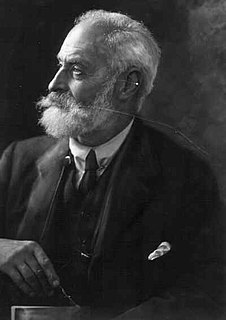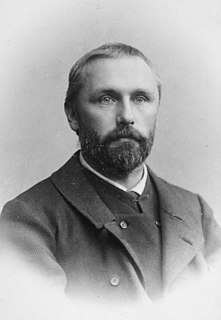Related Research Articles

Ivan Alekseyevich Bunin was the first Russian writer awarded the Nobel Prize for Literature. He was noted for the strict artistry with which he carried on the classical Russian traditions in the writing of prose and poetry. The texture of his poems and stories, sometimes referred to as "Bunin brocade", is considered to be one of the richest in the language.

The Tolstoyan movement is a social movement based on the philosophical and religious views of Russian novelist Leo Tolstoy (1828–1910). Tolstoy's views were formed by rigorous study of the ministry of Jesus, particularly the Sermon on the Mount.

Aleksandr Ivanovich Kuprin was a Russian writer best known for his novels The Duel (1905) and The Pit, as well as Moloch (1896), Olesya (1898), "Junior Captain Rybnikov" (1906), "Emerald" (1907), and The Garnet Bracelet (1911) – the latter made into a 1965 movie.

Varlam Tikhonovich Shalamov, baptized as Varlaam, was a Russian writer, journalist, poet and Gulag survivor. He spent much of the period from 1937 to 1951 imprisoned in forced-labor camps in the arctic region of Kolyma, due in part to his having supported Leon Trotsky and praised the anti-Soviet writer Ivan Bunin. In 1946, near death, he became a medical assistant while still a prisoner. He remained in that role for the duration of his sentence, then for another two years after being released, until 1953. From 1954 to 1978, he wrote a set of short stories about his experiences in the labor camps, which were collected and published in six volumes, collectively known as Kolyma Tales. These books were initially published in the West, in English translation, starting in the 1960s; they were eventually published in the original Russian, but only became officially available in the Soviet Union in 1987, in the post-glasnost era. The Kolyma Tales are considered Shalamov's masterpiece, and "the definitive chronicle" of life in the labor camps.

Yuri Pavlovich Kazakov was a Russian author of short stories, often compared to Anton Chekhov and Ivan Bunin. Born in Moscow, he started out as a jazz musician, but turned to publishing his stories in 1952. He attended the Maxim Gorky Literature Institute, graduating in 1958.
The Life and Labor Commune was a Tolstoyan agricultural commune founded in 1921 and disbanded as a state run collective farm on January 1, 1939. The commune was founded near Moscow but was later resettled in central Siberia, not far from Novokuznetsk. At its peak, it reportedly had as many as 1,000 participants. Throughout its existence the members of the commune were persecuted by the Bolsheviks, both for refusing to enlist or support their war efforts as well as for organizing themselves communally outside of the approved state structure.

Aylmer Maude and Louise Maude (1855–1939) were English translators of Leo Tolstoy's works, and Aylmer Maude also wrote his friend Tolstoy's biography, The Life of Tolstoy. After living many years in Russia the Maudes spent the rest of their life in England translating Tolstoy's writing and promoting public interest in his work. Aylmer Maude was also involved in a number of early 20th century progressive and idealistic causes.

Arvid Järnefelt was a Finnish judge and writer.
"Alyosha the Pot" is a short story written by Leo Tolstoy (1905) about the life and death of a simple, uncomplaining worker. It was published after Tolstoy's death in 1911 and received high praise from Tolstoy's contemporaries. D. S. Mirsky considered it "a masterpiece of rare perfection." Without ever calling Alyosha a holy fool, Tolstoy centers the story on his meekness, aloofness, and foolishness. Alyosha's simple life, soft-spoken manner, and calm acceptance of death epitomizes Tolstoyan principles.

Count Lev Nikolayevich Tolstoy, usually referred to in English as Leo Tolstoy, was a Russian writer who is regarded as one of the greatest authors of all time. He received nominations for the Nobel Prize in Literature every year from 1902 to 1906 and for the Nobel Peace Prize in 1901, 1902, and 1909. That he never won is a major controversy.

Dark Avenues is a collection of short stories by Nobel Prize-winning Russian author Ivan Bunin. Written in 1937–1944, mostly in Grasse, France, the first eleven stories were published in New York City, United States, in 1943. The book's full version came out in 1946 in Paris. Dark Alleys, "the only book in the history of Russian literature devoted entirely to the concept of love," is regarded in Russia as Bunin's masterpiece. These stories are characterised by dark, erotic liaisons and love affairs that are, according to James B. Woodward, marked by a contradiction that emerges from the interaction of a love that is enamoured in sensory experiences and physicality, with a love that is a supreme, if ephemeral, "dissolution of the self."

The Village is a short novel by the Nobel Prize-winning Russian author Ivan Bunin, written in 1909 and first published in 1910 by the Saint Petersburg magazine Sovremenny Mir under the title Novelet (Повесть). The Village caused much controversy at the time, though it was highly praised by Maxim Gorky, among others, and is now generally regarded as Bunin's first masterpiece. Composed of brief episodes set in its author's birthplace at the time of the 1905 Revolution, it tells the story of two peasant brothers, one a brute drunk, the other a gentler, more sympathetic character. Bunin's realistic portrayal of the country life jarred with the idealized picture of "unspoiled" peasants which was common for the mainstream Russian literature, and featured the characters deemed 'offensive' by many, which were "so far below the average in terms of intelligence as to be scarcely human."
Dry Valley is a short novel by a Nobel Prize-winning Russian author Ivan Bunin, first published in the April 1912 issue of the Saint Petersburg Vestnik Evropy magazine. Having come out soon after The Village (1910), it is usually linked to the latter as the author's second major book concerning the bleak state of Russia as a whole and its rural community in particular. It is also regarded as the last in Bunin's early 1900s cycle of "gentry elegies". The novel was filmed in 2011, directed by Aleksandra Strelyanaya.

Mitya's Love is a short novel by Nobel Prize-winning Russian author Ivan Bunin written in 1924 and first published in books XXIII and XXIV of the Sovremennye zapiski, a Paris-based literary journal in 1925. It also featured in a compilation of novelets and short stories published the same year in France.

Cursed Days is a book by Nobel Prize-winning Russian author Ivan Bunin, compiled of diaries and notes he made while in Moscow and Odessa in 1918-1920. Fragments from it were published in 1925-1926 by the Paris-based Vozrozhdenye newspaper. In its full version Cursed Days appeared in the Vol.X of The Complete Bunin (1936), compiled and published in Berlin by the Petropolis publishing house. In the USSR the book remained banned up until the late 1980s. Parts of it were included in the 1988 Moscow edition of The Complete Bunin. After the collapse of the Soviet Union, Cursed Days became immensely popular in its author's homeland. Since 1991, no less than fifteen separate editions of Bunin's diary/notebook have been published in Russia. The English translation, made by Bunin scholar Thomas Gaiton Marullo, was published in 1998 in the United States by Chicago-based Ivan R. Dee Publishers.

"Loopy Ears" is a short story by Nobel Prize-winning Russian author Ivan Bunin which was written in 1917 and gave his posthumous 1954 collection its title. The story was first published in the seventh issue of the Slovo anthology and remains to this day one of the most talked about Bunin's stories, being the first piece of work in the Russian literature featuring a serial killer as the main character. Mark Aldanov considered the story as one of the Bunin's best.

"The Gentleman from San Francisco" is a short story by the Nobel Prize-winning Russian author Ivan Bunin, written in 1915 and published the same year in Moscow, in the 5th volume of Slovo (Word) anthology. Translated into English by D. H. Lawrence, the story is one of Bunin's best known and regarded as classic.

"Antonovka Apples" is a short story by Nobel Prize-winning Russian author Ivan Bunin, written in 1900 and published the same year in the October issue of the Saint Petersburg Zhiznh (Life) magazine, subtitled "Sketches from the Epitaph book".
"Dreams" is a novella by Nobel Prize-winning Russian author Ivan Bunin, written in the late 1903 and first published in the first book of the Znanie (Knowledge) Saint Petersburg literary almanach in 1904, where it was coupled with another short novella, "The Golden Bottom", under the common title "Black Earth" (Чернозём). "Dreams" is generally regarded as the turning point in Bunin's literary career, marking the radical turn towards social issues prior to which he had mostly avoided.
References
- ↑ Иван Алексеевич Бунин. Собрание сочинений. Том 1. Повести и рассказы, 1912-1917. Изд. Художественная литература, 1965. Комментарии. 514.